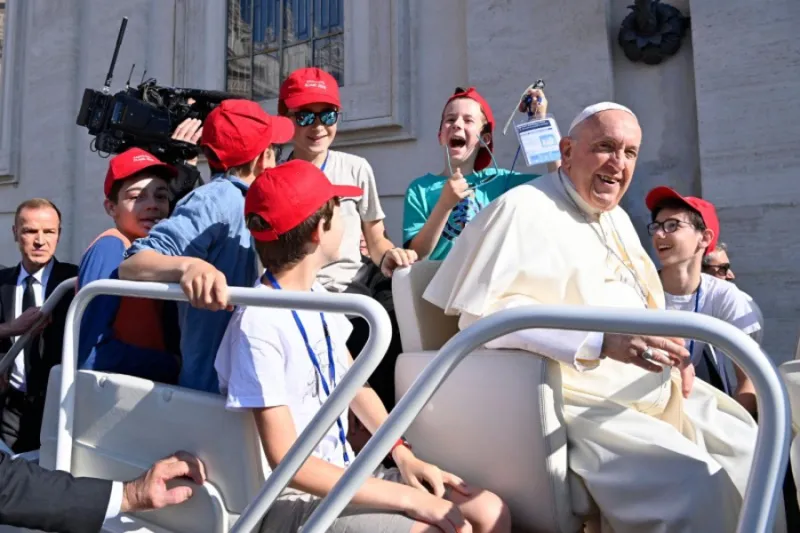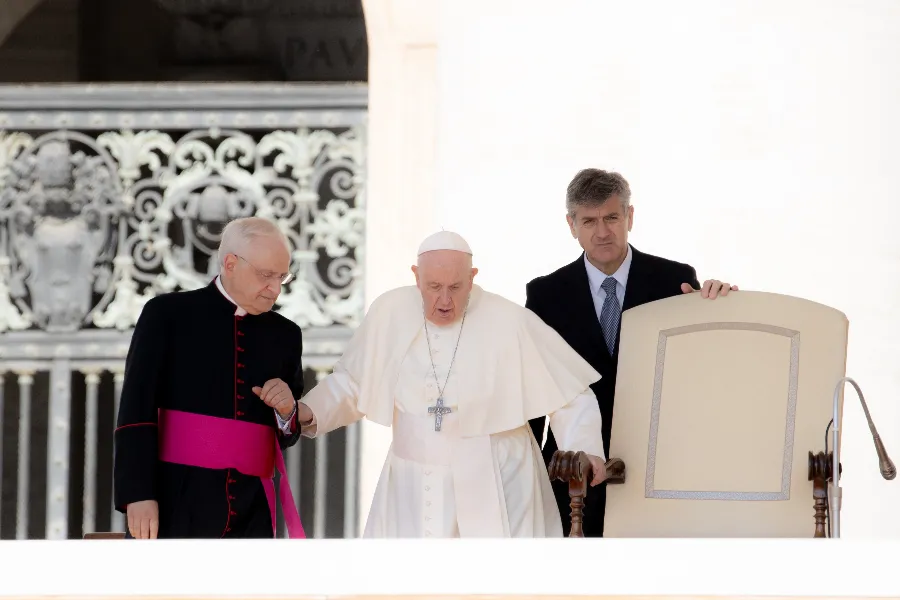
Vatican City, May 18, 2022 / 04:20 am (CNA).
Pope Francis urged Catholics on Wednesday to feel free to protest spontaneously to God when faced with suffering and injustice.
Reflecting on the Book of Job in his general audience address in St. Peter’s Square on May 18, the pope said that “God is not afraid of our prayer of protest.”
“Sometimes I meet people who approach me and say: ‘But, Father, I protested against God because I have this and that problem…’ But, you know, friend, that protesting is a way to pray when it is done like that,” he said.
“When children, when young people object against their parents, it is a way of attracting their attention and of asking that they take care of them.”
“If you have some wound in your heart, some pain, and you want to object, object even to God. God will listen to you. God is a Father. God is not afraid of our prayer of protest, no! God understands. But be free, be free in your prayer. Don’t imprison your prayer within preconceived paradigms.”
The live-streamed catechesis was the 10th in a cycle on old age that the 85-year-old pope began in February. He entered St. Peter’s Square in a white jeep, stopping to invite a group of children in red hats to join him for part of his journey past rows of pilgrims.
After touring the square, the jeep pulled up behind a raised platform in front of St. Peter’s Basilica. The pope, who suffers from knee pain, was helped to exit the vehicle and walk slowly to the white chair where he gave his address.

The pope described the Book of Job as “a universal literary classic” and meditated on how the prophet Job lost everything but retained his belief in God’s justice, despite being surrounded by spiritually ignorant friends.
He said: “On our catechetical itinerary, we meet Job when he was an old man. We encounter him as a witness of a faith that does not accept a ‘caricature’ of God, but protests loudly in the face of evil until God responds and reveals his face.”
“And in the end, God responds, as always, in a surprising way — He shows Job His glory without crushing him, or better still, with sovereign tenderness, tenderly, just like God always does.”
“The pages of this book need to be read well, without prejudices, without stereotypes, to understand the power of Job’s cry. It would be good for us to put ourselves in his school to overcome the temptation of moralism due to the exasperation and bitterness of the pain of having lost everything.”
The pope noted that Job reached a turning point at the height of his “venting,” when he proclaimed: “I know that my Redeemer lives, and at last he will stand upon the earth” (Job 19:25-27).
“This passage is really beautiful,” he commented. “It makes me think of the end of that brilliant oratorio of Handel, the ‘Messiah,’ after the celebrative Hallelujah, the soprano slowly sings this passage: ‘I know that my Redeemer lives,’ peacefully.”
“And so, after this painful and joyful experience of Job, the voice of the Lord is something else. ‘I know that my Redeemer lives’ — it is truly a beautiful thing. We could interpret it like this: ‘My God, I know You are not a Persecutor. My God will come and do me justice.’”
“It is the simple faith in the resurrection of God, the simple faith in Jesus Christ, the simple faith that the Lord is always waiting for us and will come.”
Pope Francis said that the drama of Job is played out today when “really heavy trials fall on a person, on a family, on a people.” He mentioned parents of children with serious disabilities and people with chronic illnesses.
“These situations are often aggravated by the scarcity of economic resources. At certain junctures in history, the accumulation of burdens gives the impression that they were given a group appointment. This is what has happened in these years with the COVID-19 pandemic, and is happening now with the war in Ukraine,” the pope reflected.
He asked: “Can we justify these ‘excesses’ to the higher intelligence of nature and history? Can we religiously bless them as justified responses to the sins of the victims, as if they deserve it? No, we cannot.”
“There is a kind of right that victims have to protest vis-à-vis the mystery of iniquity, a right that God grants to everyone, that indeed He himself inspires, after all.”
Concluding his address, the pope said that many elderly people walked a similar path to Job, undergoing great suffering but continuing to hold on to God’s promises.
He said: “They have suffered so much in life, they have learned so much in life, they have gone through so much, but in the end, they have this peace, a peace, I would say, that is almost mystical, that is, the peace from an encounter with God to the point they can say, ‘I knew you because I had heard about you, but now I have seen you with my own eyes’ (Job 42:5).”
“These elderly people resemble the peace of the Son of God on the Cross who is abandoned to the Father.”
After the pope’s address, a summary of his catechesis was read out in seven languages.
Addressing English-speaking Catholics, he said: “I greet the English-speaking pilgrims and visitors taking part in today’s audience, especially those from the United Kingdom, Denmark, Israel and the Middle East, Canada and the United States of America.”
“In the joy of the Risen Christ, I invoke upon you and your families the loving mercy of God our Father. May the Lord bless you!”
After addressing Italian pilgrims, Pope Francis said: “Finally, my thoughts go, as usual, to the elderly, the sick, the young, and newlyweds.”
“Dear young people, do not be afraid to put your energies at the service of the Gospel, with the enthusiasm characteristic of your age; and you, dear elderly and dear ill people, be aware that you offer a valuable contribution to society thanks to your wisdom; and you, dear newlyweds, let your families grow as places where you learn to love God and your neighbor in serenity and joy.”
If you value the news and views Catholic World Report provides, please consider donating to support our efforts. Your contribution will help us continue to make CWR available to all readers worldwide for free, without a subscription. Thank you for your generosity!
Click here for more information on donating to CWR. Click here to sign up for our newsletter.





If this pope ever manages to acquire an even minimal understanding of what Christianity is about, it will be a miracle.
Agreed.
From the above, choice Franciscan tidbits of logic are repeated: God responds to man’s suffering with “sovereign tenderness, tenderly, just like God always does.”
“…the accumulation of burdens gives the impression that they were given a group appointment.” Right. A group appointment.
“Can we justify these ‘excesses’ to the higher intelligence of nature…?” Got that! An excess of the ‘higher intelligence of nature.’ Yes, but of course! As soon as we learn to discern the brain within our garden, we’ll know more.
If only, if only we could find the Land of Oz or Alice’s rabbit hole, we do believe we’ll be alright. Meanwhile, Son of God, who suffered on a tree, Save Us!
PS: Under the care of a physician, Francis may have been medicated.
Protests are prayers of supplications. Fearless God surrounded by fearless followers is a healthy situation.